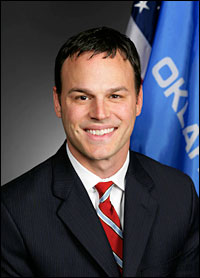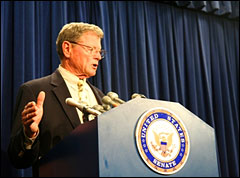
Andrew Rice.
No national politician has done more to antagonize the environmental community than James Inhofe, Republican senator from Oklahoma. As chair of the Senate Environment Committee in the last Congress, and now as its ranking minority member, he has waged war on environmental legislation and acted as a one-man firewall stopping efforts to address global warming, which he has famously called a “hoax.” Despite the ire he’s generated among greens, Inhofe has long been thought to be politically bulletproof, as a rock-ribbed conservative from a highly conservative state.
In 2008, however, for the first time in over a decade, he’ll face a challenger that some observers think may actually have a shot, if only a small one. Andrew Rice, a Democratic state senator from Oklahoma City, is young (34), charismatic, popular in his district, and genuinely progressive. He’s gotten support and attention from national-level Democratic politicians and will be a cause célèbre for the netroots and big green groups this election year.
I caught Rice by phone at home, where he was tending to his under-the-weather 6-month-old son.
Inhofe has been reelected twice now, by pretty substantial margins. No Democratic Senate candidate from Oklahoma has cleared 40 percent of the vote since 1990. Why do you think you can reverse that tide?
It’s definitely an uphill battle, but the political climate in Oklahoma this year, like in most of the country, is unique. There’s anti-incumbent sentiment. Inhofe is more vulnerable than he normally would be, because the electorate has moved away from him. He hasn’t taken any independent stances from Bush.
Some of the stuff he’s well-known for, like his comments on global warming, have happened since his last election. The famous comment about the hoax — that was in 2003.
We have our base votes of around 40 percent Democrats; he’s got about 40 percent of the electorate as Republicans; we’re going for that 20 percent swing vote in the middle. They tend to be angry with Washington, D.C., and anxious about the future of the country. They’re angry with him, and they really feel like he doesn’t get it. With that in mind, we’re running an outsider campaign against him.
Do you have any sense about how Oklahomans feel about global warming, whether it’s an issue that will get traction for you?

James Inhofe.
Photo: senate.gov
As I said, a lot of Inhofe’s more vociferous battles with the environmental community have happened since his last election. There hasn’t really been a referendum on his stances on global warming. This will be the first one.
We just had a biofuel conference in Oklahoma City, about [two and a half months] ago. Our governor is investing a lot of state money into a research center in southern Oklahoma that’s trying to perfect the ability to extract sugar out of switchgrass. You drive through western Oklahoma and see people making quite a bit of money leasing their land to energy utilities for wind. Western Oklahoma is the Saudi Arabia of wind-energy potential in the United States; it’s one of the windiest places on the North American continent.
The general public, local private interests, are already transitioning into meeting the needs of climate change. A lot of policy makers are slow to catch up. When I go travel, talking to people to find out what’s going on, people are generally concerned about it. Does that mean your average Oklahoman readily agrees with all the measures an ardent environmentalist would suggest? Maybe not.
But the interesting thing here is that Inhofe has so isolated himself as such an extremist on this debate, they will readily bring up how unhappy they are with his unreasonableness on this. I’ve been surprised that it’s a big issue among urban, mainline Protestant Republicans, people who are fiscally conservative but on other issues not as conservative as the Republican base here; they find him to be quite insensitive on this issue, and think it’s sort of a no-brainer that we have to deal with [climate change].
Those people are generally starved for representation in Congress.
They are, particularly in Oklahoma. What it’s doing is creating a new segment of swing votes for Democrats in Oklahoma that we didn’t have 10 or 15 years ago. There’s not much room in their party anymore for Rockefeller Republicans. We feel confident we can peel them off.
We also feel confident we can peel off voters in the evangelical community on this “creation care” movement. The National Association of Evangelicals, which represents 30 million evangelicals nationwide, has broadened the scope of their platform for the upcoming elections. Some of their top issues are climate change, Darfur, poverty. Their climate-change expert, Rich Cizik, is a huge evangelical leader. He and Inhofe are nemeses; Inhofe has attacked him relentlessly.
Is the public seeing changes in Oklahoma that can be traced to climate change?
I’m not a scientist to know if there is an actual linkage, but the big thing in Oklahoma has been that from 2002 to 2006 we had a tremendous drought, on the level that they’re having in Georgia. It was worse than the Dust Bowl drought. The agriculture industry was hit terribly bad from that.
Then this year we’ve had torrential downpours and flooding like we haven’t had for literally decades, that have destroyed crops to the same degree. When you go to these areas, they all say the same thing: “I don’t know what’s going on, but something’s going on.” These are people, their dads were farmers and their granddads were farmers, they’re intimately aware of the local environment and ecosystems. We really don’t have much of a hard sell to make here.
Do you support the Lieberman-Warner climate bill that’s headed to the floor of the Senate?
I do, as a stepping stone. It seems reasonable for right now, given that it’s moving in the right direction. I am a little uneasy with the large incentives it’s giving companies that have been doing quite well, and have been slow to change their practices, but I think that’s just part of the short-term transition. There’s quite a bit of bipartisan support for it in the Senate. Inhofe is pretty isolated. Rumor has it he’s preparing 106 amendments for it. He had a two-hour rant against it about a while ago.
I think he feels he has to stick to his guns, but he’s very defensive about these issues on his website. His staff knows that he’s vulnerable on it. Five years ago they were very cocky, thinking, oh gosh, this is a liberal issue, people are overreacting, people in Oklahoma surely don’t care about this. What they’re realizing is that they’re wrong. I think they’re going to try to have it both ways. For his base that seems to love him taking on the caricature of Al Gore, he’s going to say one thing, but on the other hand I think he realizes that there are a lot of reasonable people in the middle in Oklahoma as well, who just don’t have much of an appetite for how isolated he is, even from his own party.
Could fighting climate change benefit Oklahoma’s economy?
Absolutely. This is a win-win for Oklahoma, particularly around wind energy. We’re really in a position to be able to provide clean, renewable energy [to nearby states].
I’ve got two bills [in the state Senate], one that’s going to be converting our state vehicles to alternative fuels, and another that’s going to be doing an energy-efficiency study of our schools and state buildings, trying to find ways to save money. I have rural Republican state Senate colleagues who were very supportive of these ethanol, biofuel, wind-energy initiatives we have; it’s not a partisan issue for them, because they have constituents in their communities poised to benefit from developing these programs.
I know your personal experience on 9/11 drove you to enter the political process. [Rice lost his brother in the attack on the World Trade Center.] How do you see the role of energy and environment in national-security issues? Do you think Inhofe sees any connection?
In the 21st century, they overlap quite a bit. Whether I lost my brother or not, I’m very concerned about these issues, achieving independence from the Middle East. A lot can be made of that issue in a sincere way. It can help protect us over the long term, the more we’re able to be innovative and develop a broad portfolio of our own energy sources in this country. I understand it’s going to be a big transition, an evolving process, but it’s something that if I get into Congress I’ll be working on.
Whether Inhofe understands or not, I don’t know. I think he is just concerned about taking care of the people who are taking care of him: Big Oil.
He’ll get a ton of support from the oil and gas industry. Where do you think your support is going to come from?
We’re getting varied support. We’ve got people in the environmental community. We have traditional Democratic donors here in the state. The [Democratic Congressional Campaign Committee] has been pretty helpful, which is another sign that Oklahoma’s in play. There’s some possibility even within the energy sector — it’s not as cut-and-dried as it used to be there. The netroots is an important part of our campaign, like a lot of these insurgent challenger campaigns. We have a lot of support among our base here, small-donor support. We’re getting it everywhere we can.
[Inhofe] will have quite a bit of special-interest PAC money. I actually came within $40,000 of matching his individual contributions last quarter, but he had about $280,000 of PAC money and I had $6,000. That’s his bread and butter. It’s hard to fundraise against an incumbent, but the five [U.S. Senate] challengers last election year that beat Republican incumbents were all behind in the money game, but they ran good campaigns. It’s not easy, but if you do the campaign right, and the incumbent brings out the old playbook, thinking it’s a normal election year, there comes a point where their money advantage becomes irrelevant. We’ll see.
Finally, I’m told you’re a big Flaming Lips fan. How do we know you’re not just pandering to Oklahoma’s psychedelic pop constituency?
[Laughs.] It’s not a huge building block in Oklahoma. But no, they’re great — the lead singer, Wayne, is a friend of mine. He lives here in my district in Oklahoma City. In fact, you’ll be happy to know that the establishment of Oklahoma City, the downtown chamber crowd, they have fully embraced the positive role the Lips play in our local economy. They’ve just named an alley in Bricktown after them.
That’s great. All right, thanks for taking the time.
Grist has requested an interview with Sen. James Inhofe, Andrew Rice’s opponent. Grist does not endorse Rice nor any other candidate for political office.

